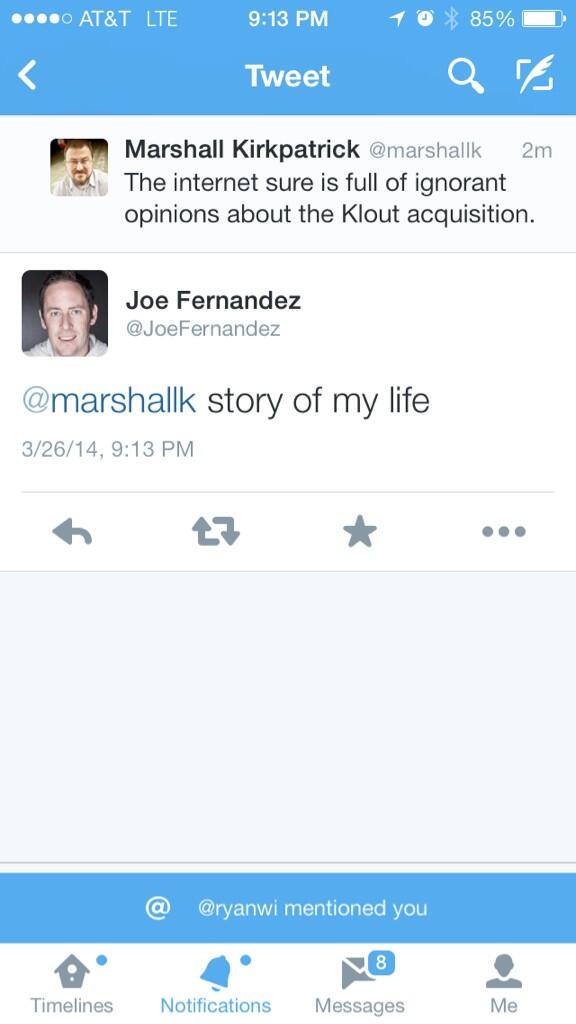When Kara Swisher broke the story last month, it seemed implausible, and perhaps even ridiculous to many at first. I theorized shortly thereafter why it might make sense for Lithium Technologies, known primarily as a customer community vendor, to acquire Klout, often considered both “the standard” and that laughing stock of online “influence”.
This brief exchange between Joe Fernandez, Klout CEO and Marshall Kirkpatrick, CEO of Little Bird frames this dynamic beautifully.
Yesterday, Fortune broke the story that the deal indeed was done for $200 million of cash and stock. Inside sources tell me that the transaction details are WAY off.
However, Lithium did make the official announcement today, and it appears that much of my theory was correct. You can read what I proposed back in February here.
What it means
Lithium acquires both a platform and capabilities that will enable them to better understand the dynamics of digital interactions for a broader set of individuals than exist within their more than 300 customer communities.
Connecting digital behaviors on a broader scale to digital behaviors within a narrower context of a brand’s community holds significant promise.
At the center of many customer focused activities, is understanding the customer better, not just based on transactional data, but psychographic, behavioral, and sociographic data. Gaining a deeper understanding of these individuals and the impact of their actions on digital networks will potentially allow Lithium to make better sense of the world, and theoretically craft new value propositions for both brands and consumers, as the lens narrows on their respective interests.
Two core components of making communities work are content and gamification. It is the content that helps continually stoke interesting dialogue, info exchange, and transactions within the context of a community and using gamification techniques helps to incentivize the desired behavior of community participants.
Klout’s recent pivot to include capabilities to discover and share content is an interesting twist here. Klout’s perks program potentially adds another layer to Lithium’s gamification capabilities, both in terms of function and scale.
By understanding who people are, what they’re interested in, who they’re connected to, and allowing them to discover and share interesting content with their “communities” (both branded and those that span other digital networks), Lithium may be able to enable better paths of knowledge and value exchange across previously siloed domains.
Leveraging perks as another way to incentivize desired behavior to provide new pathways of discovery, stoke existing community interactions, and amplify tangible business benefits with more intelligent and efficient allocation of resources may also prove to be a valuable lever for brands to create and extract more value from their customer communities.
The road ahead
It’s a bold move, and one that holds promise, from my view. Of course, world renowned data scientist, Dr. Michael Wu is undoubtedly ecstatic about the new found treasure trove of data he gets to explore with the Klout team. Data is a very key element here, as is the data science talent they’ve acquired.
However, there are significant hurdles to overcome
Klout is a bit of a conundrum. For a while, they were indeed the “standard of influence” for many of the social medialites, who were all excited about their new found place in the world. All of a sudden, someone was saying they were important, and that sharing photos on instagram and funny quips on facebook really mattered. People in the social media world were indeed being hired, fired, and promoted based on their Klout score. However, they’ve come under a lot of scrutiny, for obvious reasons. The category and territory of digital influence is an important one, but Klout’s approach and branding has not often won me over. As a user, the “perks” that I’m offered as an influencer are rarely interesting or enticing, and I’m not quite sure how many repeat (brand) customers they have or how effective and meaningful the perks program is for brands or for consumers. Because of the challenges and the brand perception of Klout, Lithium will need to work hard to craft a story that helps to clearly articulate the benefits of these new capabilities. This will be a significant exercise in itself.
In parallel, the real work begins of integrating and leveraging these new found capabilities. Lithium now has a green field of opportunities to consider. This is not a slam dunk, obvious play. Choosing the right paths, and then successfully executing will be no easy task. If able to execute, this may propel Lithium to be a meaningful player that bridges the consumer web with brands and enterprises, instead of just a community platform provider. This play has arguably much greater upside than their current business model, but the complexity could also lead towards an absolute mess of a business model, market perception, and the difference between ultimate success and failure.




